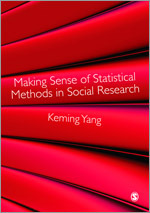
Making Sense of Statistical Methods in Social Research
- Keming Yang - Durham University, UK
Whereas other statistical methods books instruct students in how to get through the statistics-based elements of their chosen course with as little mathematical knowledge as possible, this book aims to improve students' statistical literacy, with the ultimate goal of turning them into competent researchers.
Making Sense of Statistical Methods in Social Research contains careful discussion of the conceptual foundation of statistical methods, specifying what questions they can, or cannot, answer. The logic of each statistical method or procedure is explained, drawing on the historical development of the method, existing publications that apply the method, and methodological discussions. Statistical techniques and procedures are presented not for the purpose of showing how to produce statistics with certain software packages, but as a way of illuminating the underlying logic behind the symbols.
The limited statistical knowledge that students gain from straight forward 'how-to' books makes it very hard for students to move beyond introductory statistics courses to postgraduate study and research. This book should help to bridge this gap.
This book is an enjoyable read and helps unlock the potential of statistics to many of us who many have avoided them due to fear
Annika Coughlin
SRA: Reviews
Making Sense of Statistical Methods in Social Research is a very useful textbook for students who aim at learning how to approach scientific problems, apply statistical methods to social research, achieve valuable research results, and avoid making mistakes in research process. The volume is ease-accessible, highly readable, free from statistical jargon, and well-structured as it clearly traces the elements of statistical research. The conceptual framework is clearly introduced, which make the presentation of statistical methods and research process easy to follow and understand. Importantly, Keming Yang sheds considerable light on issues giving students problems, such as methods for analyzing latent variables. Last but not least, it provides readers with highly inspiring discussion on the exploratory potential and limitations of research tools.
The book has a nice mix of good introductory explanation of statistical theory and the relevance of certain methods without refraining from showing the mathimatical foundations. We did not choose it for the course because it lacked a discussion of multilevel analysis and within time series VAR analysis.
Some sections will be prescribed. This is an excellent overview of and discussion of some pertinent problems.
This is a comprehensive guide to statistical methods in social research with chapters that will benefit students and researchers alike in the way that they build in complexity with regards to their content. This cumulative affect makes the more demanding areas of statistical methods less daunting.
Making sense of statistical methods in social research, Yang (2010) is an easy-to-follow piece.The book will be extremely useful to students taking PhD, statistics and/or quantitative research methods course because of the detailed formulas that are provided. I also recommend it to instructors in statistics and quantitative methods.
Might be good for the BSc (Hons) I will be teaching on in Sept 2012, but not essential for foundation degree level
I liked the book a lot - it sets out statistics in a similar way to how I teach it. Also it does (as it promises) give the ideas behind the techniques rather than losing the wood for the trees (which can happen with other SPSS related textbooks). However my area is psychololgy and I was hoping that the book would be general enough to apply well to psychology as well as social research. However, it is quite specific to social science research so in the end I decided not to adopt it.



